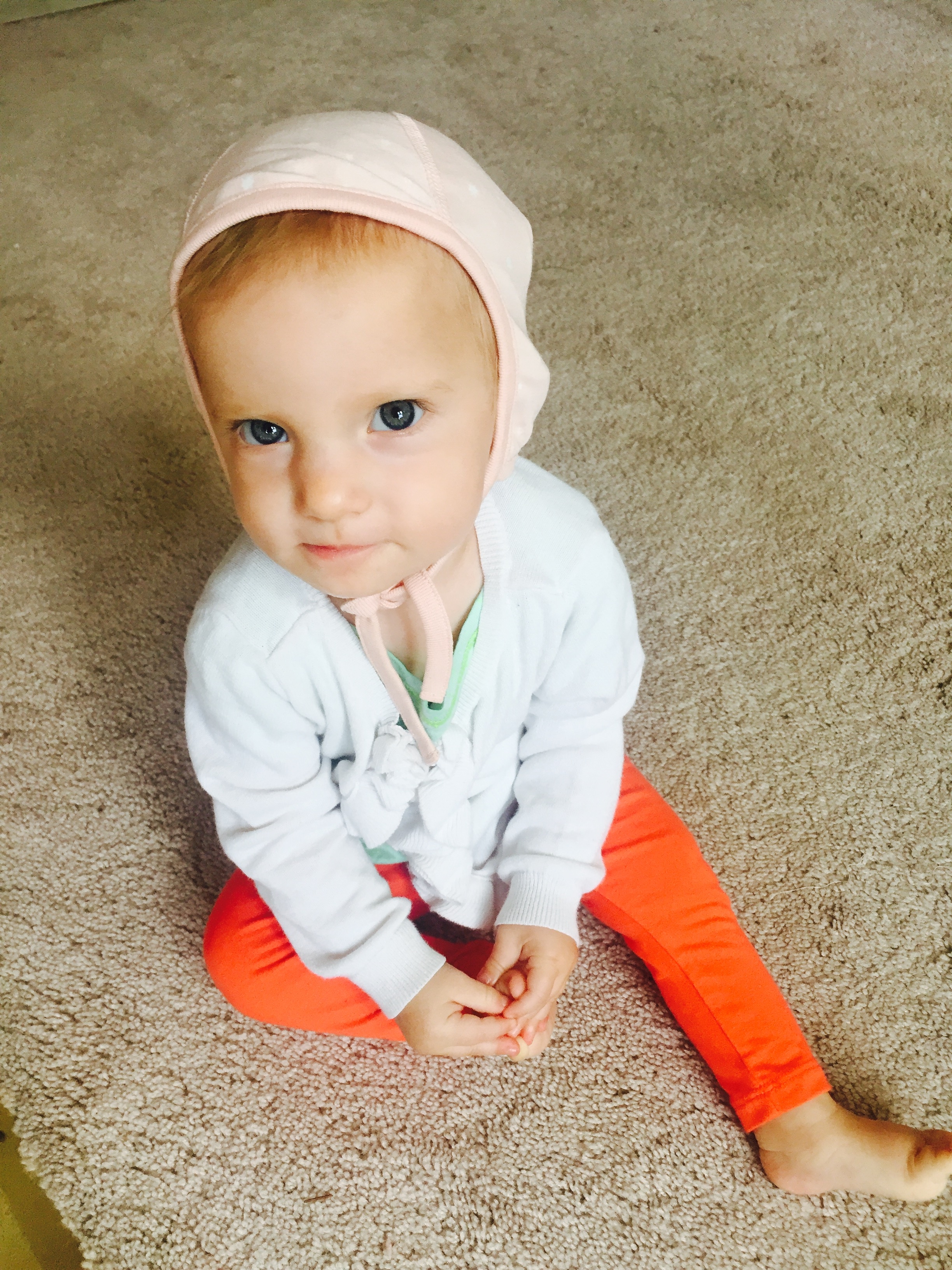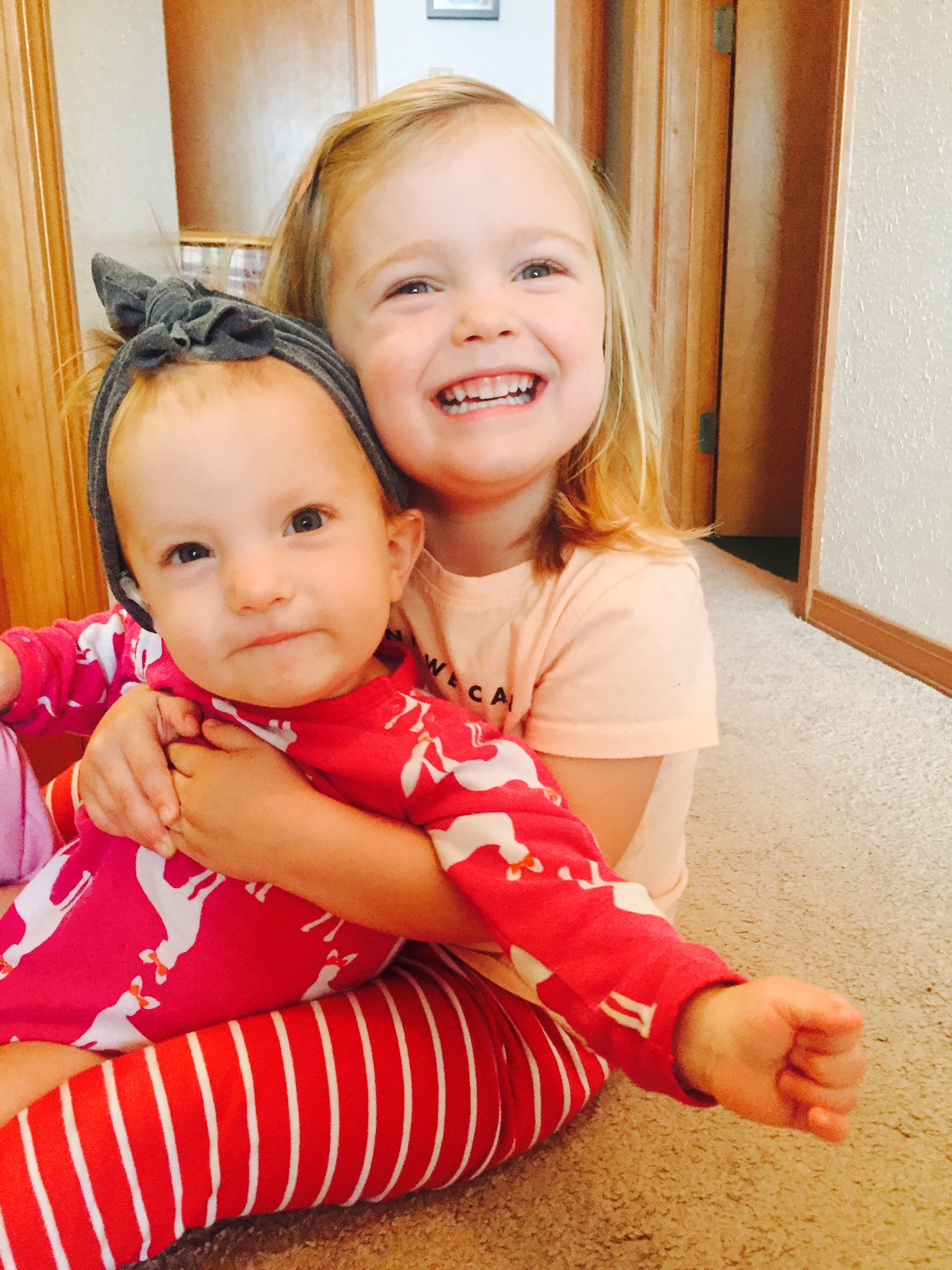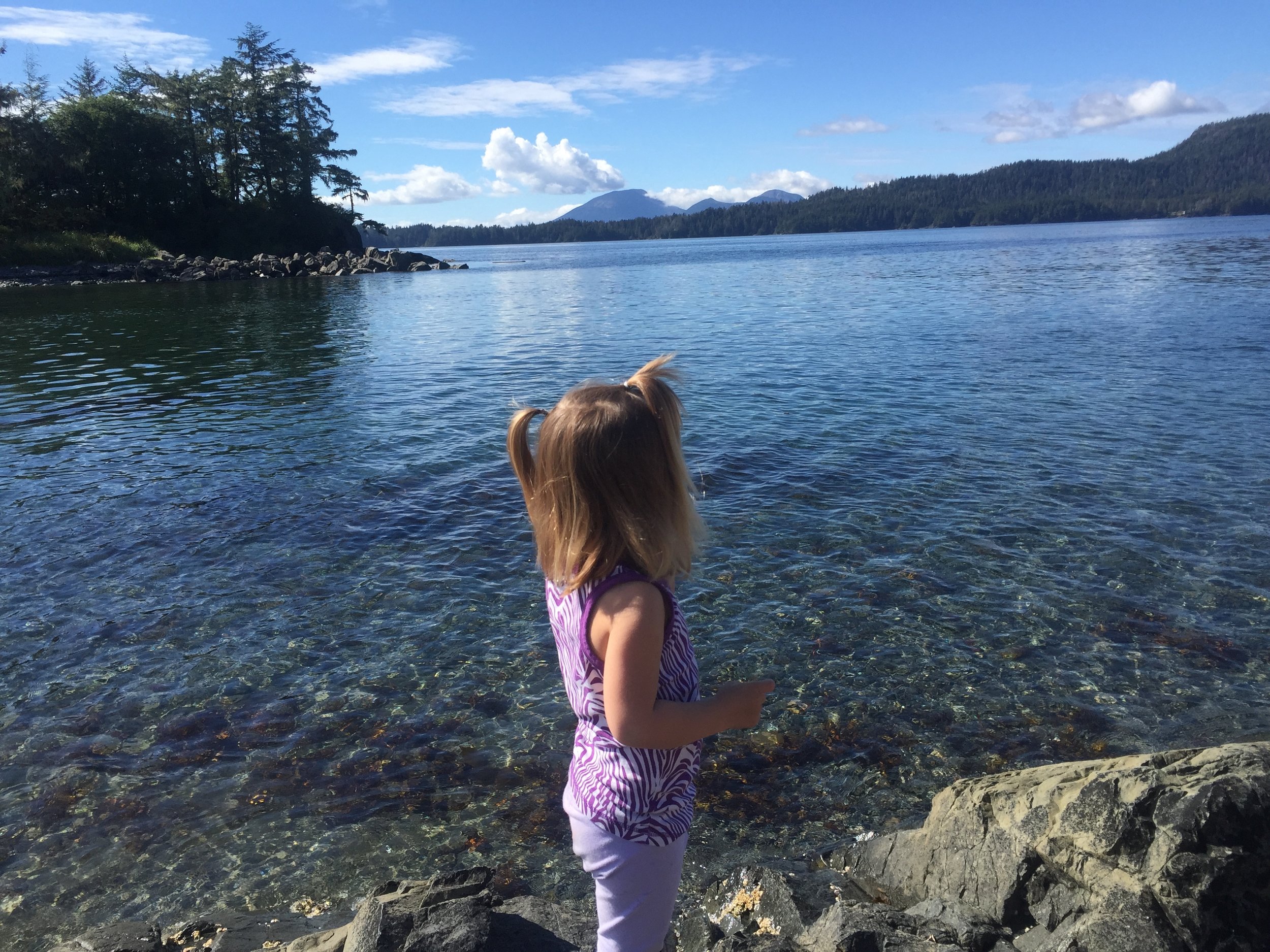The Parts of Speech for Here
 Anna's progress has been so fast and enthralling, it's hard to write about it without seeming sentimental and braggy. She's saying Mama and Dadda, albeit sparingly, and more frequently, words like hot when she touches my coffee and up when she hinges to standing. It's possible that when she screams "Yay-Ghee!!!" she means Zaley. She's 14 months now, but given that we activated her implants only four months ago, we should conservatively expect her to have only reached four-month speaking and listening milestones at this point (babbling, cooing, some usage of vowels). I never forget that she's deaf, but I do often take for granted her hearing. Every day, she does something new, and each time there is a newness, I stop to marvel that this child of ours whom we thought would never hear or speak now swivels her head to her name and lifts an upturned palm when I say, "Where's the ball?" or "Where's Zaley? Where's Daddy?"
Anna's progress has been so fast and enthralling, it's hard to write about it without seeming sentimental and braggy. She's saying Mama and Dadda, albeit sparingly, and more frequently, words like hot when she touches my coffee and up when she hinges to standing. It's possible that when she screams "Yay-Ghee!!!" she means Zaley. She's 14 months now, but given that we activated her implants only four months ago, we should conservatively expect her to have only reached four-month speaking and listening milestones at this point (babbling, cooing, some usage of vowels). I never forget that she's deaf, but I do often take for granted her hearing. Every day, she does something new, and each time there is a newness, I stop to marvel that this child of ours whom we thought would never hear or speak now swivels her head to her name and lifts an upturned palm when I say, "Where's the ball?" or "Where's Zaley? Where's Daddy?"
 Here, we have no obligations besides Anna's therapies and it feels, in some ways, that I can surrender to our new language of narrating for her much more completely than I can at home. We don't drive much, and our plans often come the day-of. On Tuesdays, we have our online Auditory-Verbal Therapy, which is basically a video conference with our therapist at her quiet Denver office, on one end, and, on this end, an hour long spectacle of trying to keep Zaley from placing her body in front of the camera on the iPad, keeping Anna from grabbing the iPad, carrying the iPad from room to room to distract from whatever meltdown is happening, and trying to make breakfast, feed breakfast, and listen to ways I could be adding more language to every activity, every motion, every single thing. The goal is that we will grow Anna's hearing and responding a year's worth in only six months.
Here, we have no obligations besides Anna's therapies and it feels, in some ways, that I can surrender to our new language of narrating for her much more completely than I can at home. We don't drive much, and our plans often come the day-of. On Tuesdays, we have our online Auditory-Verbal Therapy, which is basically a video conference with our therapist at her quiet Denver office, on one end, and, on this end, an hour long spectacle of trying to keep Zaley from placing her body in front of the camera on the iPad, keeping Anna from grabbing the iPad, carrying the iPad from room to room to distract from whatever meltdown is happening, and trying to make breakfast, feed breakfast, and listen to ways I could be adding more language to every activity, every motion, every single thing. The goal is that we will grow Anna's hearing and responding a year's worth in only six months.
 It feels, as a writer, that all of my work is aimed at adding accurate language to real life. This kind of linguistic addition to Anna's development is oddly what I've trained for. But it comes with the same impediments as adding language with writing does, too: fatigue, monotony, feeling that no matter what, there are not enough words or enough time to supply sufficient verbiage to the complex and fleeting experience of life. How do you catch up on a near-year of silence? Do I say that the salmon we are eating says swish, swish, swish or does that confuse the sparkling animal on the end of Zaley's line? Also, is it respectful of Anna to always be pumping sounds at her? Sometimes, don't we all need--especially a deaf-born brain--some peace, some moments that do not need to be given parts of speech?
It feels, as a writer, that all of my work is aimed at adding accurate language to real life. This kind of linguistic addition to Anna's development is oddly what I've trained for. But it comes with the same impediments as adding language with writing does, too: fatigue, monotony, feeling that no matter what, there are not enough words or enough time to supply sufficient verbiage to the complex and fleeting experience of life. How do you catch up on a near-year of silence? Do I say that the salmon we are eating says swish, swish, swish or does that confuse the sparkling animal on the end of Zaley's line? Also, is it respectful of Anna to always be pumping sounds at her? Sometimes, don't we all need--especially a deaf-born brain--some peace, some moments that do not need to be given parts of speech?
 Despite the hassle of remote therapy, I will say, it is working. Anna has started to give a conditioned response we've been working on for months: when I hand her a pink or orange or yellow puffball Zaley picked out at the crafts store, I make a sound, and then Anna holds the puff up to her ear, raises her eyebrows (mimicry is the goal of teaching a conditioned response), and then pushes it into a lidless water bottle. Later, this will be how she shows us that she is hearing all the sounds. (Eventually, if she doesn't put the puff in the bottle, she didn't hear it). And, naturally, if she's not hearing the sound, she won't be able to say it, use it in words.
Despite the hassle of remote therapy, I will say, it is working. Anna has started to give a conditioned response we've been working on for months: when I hand her a pink or orange or yellow puffball Zaley picked out at the crafts store, I make a sound, and then Anna holds the puff up to her ear, raises her eyebrows (mimicry is the goal of teaching a conditioned response), and then pushes it into a lidless water bottle. Later, this will be how she shows us that she is hearing all the sounds. (Eventually, if she doesn't put the puff in the bottle, she didn't hear it). And, naturally, if she's not hearing the sound, she won't be able to say it, use it in words.
 Add to her language all the other ways Anna seems to be erasing her diagnosis from my daily thoughts and I would say we have arrived at a place I thought impossible last summer in the shadow of her diagnosis with congenital cmv: she stands up fluidly, as though she doesn't need to think about it. If I lie on the ground, she smiles a wide and fierce oval that reveals two close-together teeth on the bottom, and she clambers up me, hissing and screeching, smiling and drooling, like a tiny dragon in a headband. She sleeps, she eats, she is a constancy of surprises.
Add to her language all the other ways Anna seems to be erasing her diagnosis from my daily thoughts and I would say we have arrived at a place I thought impossible last summer in the shadow of her diagnosis with congenital cmv: she stands up fluidly, as though she doesn't need to think about it. If I lie on the ground, she smiles a wide and fierce oval that reveals two close-together teeth on the bottom, and she clambers up me, hissing and screeching, smiling and drooling, like a tiny dragon in a headband. She sleeps, she eats, she is a constancy of surprises.
I have spent a great part of Anna's infancy in fear and thought. Now, it feels like her place in my life is shifting to one that I can observe with less fear, more confidence in the unknowns, a kind of wonder that washes me in curiosity and pride rather than questioning and guilt. I think of all the other mothers of children with Anna's condition, the ones who have it worse, and I grieve for their longer road, the despair in a mother that accompanies any lag in any child's body.  I continue to wonder: how can all children be innocent and good and some must bear the badness of a virus (or whatever) in a much more impeding way? I do not believe in karma. I do not believe that anything we do or have done causes this kind of suffering. I do know that children do not need mobility or speech to astonish us; more often, it is just a look in the eye of a child that fixes me in time, roots me to something huge and spreading and wordless. I also know that mothers who suffer greatly have lives that bloom--not slowly or reluctantly, but wildly and wisely--from an origin of darkness. I know because of the emails from other cmv moms who have read this blog. You, moms, in the U.S. and South Africa and New Zealand and Europe, thank you: you are the main reason I write here. You are the boat that arrives at this island unannounced. You have lights and oars and open hands I can touch late at night when I reread what you have written to me.
I continue to wonder: how can all children be innocent and good and some must bear the badness of a virus (or whatever) in a much more impeding way? I do not believe in karma. I do not believe that anything we do or have done causes this kind of suffering. I do know that children do not need mobility or speech to astonish us; more often, it is just a look in the eye of a child that fixes me in time, roots me to something huge and spreading and wordless. I also know that mothers who suffer greatly have lives that bloom--not slowly or reluctantly, but wildly and wisely--from an origin of darkness. I know because of the emails from other cmv moms who have read this blog. You, moms, in the U.S. and South Africa and New Zealand and Europe, thank you: you are the main reason I write here. You are the boat that arrives at this island unannounced. You have lights and oars and open hands I can touch late at night when I reread what you have written to me.
 We will leave this physical island in two weeks. I think about time so much here that I wonder if I am slowing time down. The last month has felt long. Kids here have started school, some friends have left for their homes and for the beginning of school down south. I told Luke the other night that part of my struggle here is that no day feels different. Fishing season affords little novelty, no weekends: up with children, play with children, feed the children, repeat. Living on an island doesn't help. Drive to town, drive home from town. It is like a long hallway of rain. And it can feel like a season-less season here, the sky low and immobile, the trees lightly shaking, the temperature at an incessant hover of 60-degrees.
We will leave this physical island in two weeks. I think about time so much here that I wonder if I am slowing time down. The last month has felt long. Kids here have started school, some friends have left for their homes and for the beginning of school down south. I told Luke the other night that part of my struggle here is that no day feels different. Fishing season affords little novelty, no weekends: up with children, play with children, feed the children, repeat. Living on an island doesn't help. Drive to town, drive home from town. It is like a long hallway of rain. And it can feel like a season-less season here, the sky low and immobile, the trees lightly shaking, the temperature at an incessant hover of 60-degrees.
The last three days, though, Sitka erupted with sun. You can see all of the mountains, the dramatic slate stones at their peaks, the named ones--Verstovia, Harbor Mountain, my favorite and the most majestic: The Sisters--rising above the town's yellows and reds and browns with a grandeur I have never seen anywhere else. When you drive on a sunny day, it is impossible to keep your eyes on the road, the mountains drawing all attention, showing off after such long stretches of being shut in.
 Today, there were kids launching off the dock into Swan Lake and people summiting Gavin Ridge, and we passed everything and would have called everything lovely and we felt giddy and summery because everything's sunny and we wore tank tops and we were going to the beach. Anna sat in the ocean and squeeled like a happy pig. Zaley covered the baby's legs in mud and a friend watching with her son said, "Now that's what it's all about." Both girls could hear the water, the waves never large, just a lapping that repeats comfortably, like the sounds we are always offering Anna. She points at the ocean vigorously any time we are up close, like she's showing me something way out there. Dad? A low-flying float plane? Land? Maybe here, just here.
Today, there were kids launching off the dock into Swan Lake and people summiting Gavin Ridge, and we passed everything and would have called everything lovely and we felt giddy and summery because everything's sunny and we wore tank tops and we were going to the beach. Anna sat in the ocean and squeeled like a happy pig. Zaley covered the baby's legs in mud and a friend watching with her son said, "Now that's what it's all about." Both girls could hear the water, the waves never large, just a lapping that repeats comfortably, like the sounds we are always offering Anna. She points at the ocean vigorously any time we are up close, like she's showing me something way out there. Dad? A low-flying float plane? Land? Maybe here, just here.